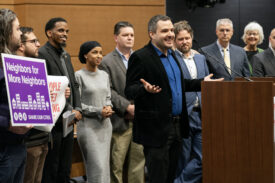In last week’s online edition of the Nation, a forum called “One Thing to Do About Food” posed the question, “How does America fix its dysfunctional relationship with food?” and invited 12 well-known writers (who are also farmers, academics, politicians, and activists) to give their thoughts. Alice Waters edited it, and Eric Schlosser, Wendell Berry, and Jim HIghtower are among the contributors.
While all are worth reading, I suggest you take a look at Michael Pollan’s piece on the national farm bill and how its low profile among both citizens and legislators has a big impact on what we eat—and our health.
Signed every five years by the President, the farm bill governs the production of agriculture and livestock on “a couple hundred million acres of private land,” affecting the make-up of the American food system by deciding what and where crops are produced and how much they will cost.
Most important, it controls the amount of aid given to agricultural producers—the majority, of course, goes to corn and soybean farmers.
These crop subsidies (which are designed to encourage overproduction rather than to help farmers by supporting prices) are the reason that the cheapest calories in an American supermarket are precisely the unhealthiest.
Children may be affected most, because…
the school lunch program is designed not around the goal of children’s health but to help dispose of surplus agricultural commodities, especially cheap feedlot beef and dairy products, both high in fat…
If you haven’t heard of the bill, you’re not alone. Typically only farm-state legislators bother to vote for it each year, while the rest trade their agricultural votes for votes on policies that are of higher concern in their districts.
The result of this and other factors, as we’ve noted here, is a surplus of cheap, calorie-dense food that fails to nourish us; especially “food insecure” and low-income households. It’s no surprise that groups with the highest poverty rates also have the highest obesity rates.
As Pollan says, perhaps the farm bill should be renamed the food bill so we pay it more attention when it comes up for renewal in 2007. You can read about it here, including transcripts for each state’s own version.






